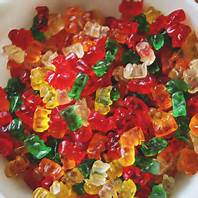The Gummy Bear Diet

I was recently talking to someone close to me who is participating in a weight loss challenge at work. The company hired a personal trainer to give each participant a plan to follow. Apparently, there were some participants who didn’t like the calorie count of their food plan. They were certain they needed only 1200 calories per day and the trainer had recommended 1400-1600 depending on whom you ask.
Let me oversimplify dieting for just a minute by summarizing some basic principles of dieting.
- All diets work. If you eat few enough calories, you can be on the Gummy Bear Diet and will likely lose weight. Your body is pretty simple when it comes to eating, because food is your body’s fuel. If you give it less fuel to burn, it has to draw on reserves, resulting in weight loss. Most diets fail because they can’t be sustained over time. Not only would the Gummy Bear Diet be unhealthy, after awhile you would start to experience some health issues from inadequate nutrition.
- There is such a thing as eating too little. If you don’t eat enough food your body, which hasn’t evolved much in thousands of years, may think you are experiencing a food shortage and you’ll hang on to the weight you have amassed over the times of bounty. If you’ve heard that 1200 calories is an appropriate number of calories for weight loss, consider that this number represents the lowest number of calories experts believe we need to get adequate nutrition. It is a minimum value.
- Don’t forget to factor in physical activity. The conventional wisdom right now is that diet accounts for about 80% of your success in weight loss and maintenance and exercise about 20%. That doesn’t mean exercise is not important though! Exercise is an important lifelong habit to adopt in order have a better quality of life as you age. It is also important to maintaining muscle. Why is muscle important? Because muscle tissue requires more calories to sustain than fat tissue. Exercise will also help you manage your weight better over time, according to the National Weight Control Registry.
- Slow and steady wins the race. The more slowly you lose weight, the more likely you are keep it off. One simple strategy to accomplish that is to aim for a 3500 calorie reduction per week. That’s the number of calories in a pound of fat. You can divide the calories between food and activity. For example, if I exercise 4 days per week and burn 250 calories, that equates to 1,000 calorie deficit which means I have to eliminate 2500 calories from my diet over the course of the week.
Dieting is not quite as simple as this, so let’s get back to reality. Losing weight depends on many variables — how well you’ve planned for barriers to success, support from friends and family, health status and access to healthy foods. Eating less food and moving more is a proven strategy for losing and maintaining weight loss. Eating mostly healthy foods and learning to eat less healthy foods only occasionally is a good recipe for success for most of us. Why? Because, unlike the Gummy Bear Diet, we can learn to maintain the healthy habits that will help us achieve our weight loss goals and keep the weight off.

















